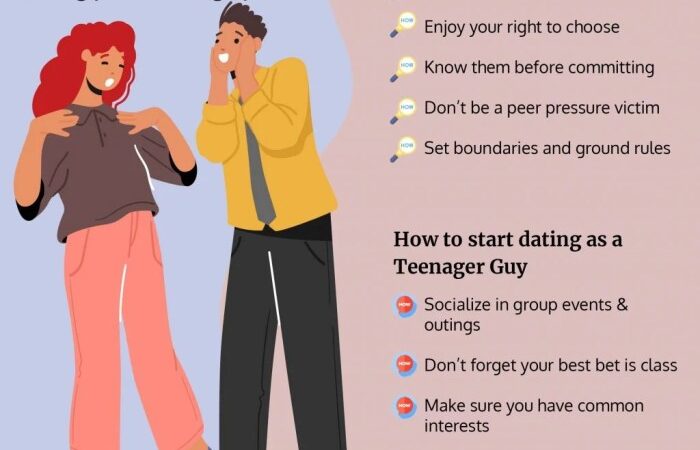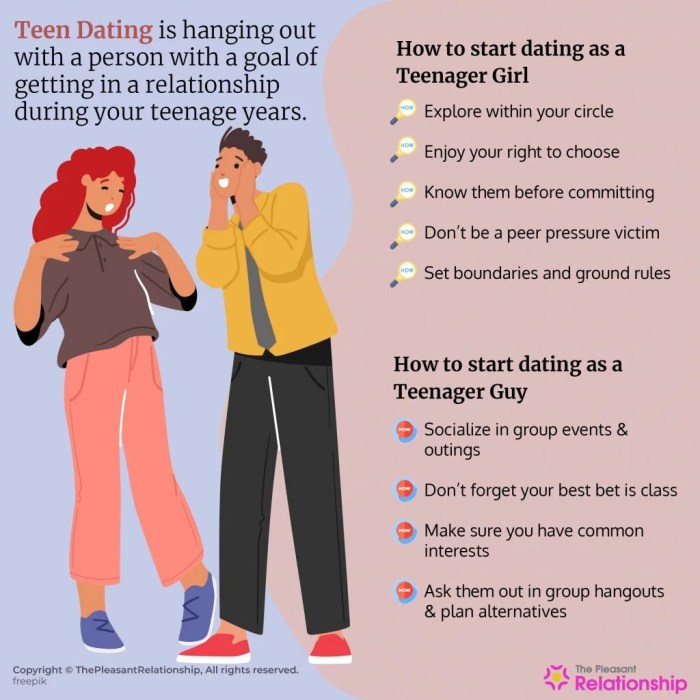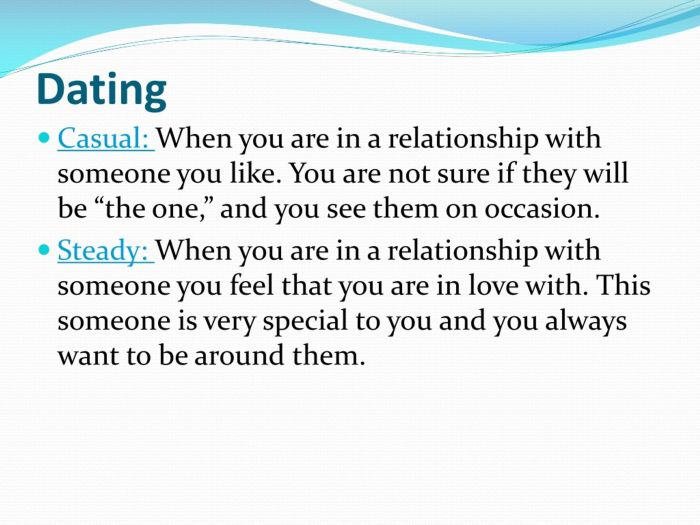Define Dating: Exploring the Evolution of Romance

Define dating sets the stage for this enthralling narrative, offering readers a glimpse into a story rich in detail and brimming with originality from the outset. Dating, a practice as old as time itself, has undergone a dramatic transformation, evolving from arranged marriages to the digital age of swiping and algorithms.
This exploration delves into the fascinating history of dating, examining how societal norms, technological advancements, and cultural influences have shaped the way we connect, court, and ultimately, find love.
From the traditional courtship rituals of the past to the modern-day complexities of online dating platforms, we will journey through the diverse landscape of romantic connections. We will analyze the various motivations and goals behind dating, shedding light on the psychological factors that drive our choices and shape our experiences.
This journey will not only provide a comprehensive understanding of dating but also offer insights into the future of romantic relationships in a world that is constantly changing.
The Evolution of Dating
Dating, as we know it today, has undergone a dramatic transformation over the centuries, shaped by societal norms, technological advancements, and evolving cultural values. From the structured arrangements of the past to the diverse and dynamic landscape of the present, the journey of dating offers a fascinating glimpse into the changing dynamics of human relationships.
Historical Context of Dating
Dating practices have evolved significantly throughout history, reflecting the changing social structures and cultural norms of different eras. Traditionally, arranged marriages were prevalent, particularly in societies with strong familial ties and social hierarchies. These arrangements were often based on economic, political, or social considerations, rather than individual romantic preferences.
- In ancient civilizations, such as Greece and Rome, marriages were primarily arranged by parents or guardians, with emphasis on lineage, wealth, and social status.
- During the Middle Ages in Europe, arranged marriages remained the norm, often facilitated by the Church and nobility.
- In the 18th and 19th centuries, the rise of romanticism and individualism gradually shifted the focus towards personal choice in marriage.
Traditional Dating Practices
Before the advent of technology, dating involved a more traditional approach, characterized by face-to-face interactions, courtship rituals, and social gatherings.
- Dating often began with introductions through friends, family, or community events.
- Courtship rituals, such as formal dinners, dances, and letter writing, played a significant role in building relationships.
- Social gatherings, such as dances, picnics, and church events, provided opportunities for individuals to meet potential partners.
Contemporary Dating Trends
The 21st century has witnessed a dramatic shift in dating practices, driven by the widespread adoption of technology and the evolving social landscape. Online dating platforms and mobile apps have become ubiquitous, providing individuals with a vast pool of potential partners at their fingertips.
- Dating apps, such as Tinder, Bumble, and Hinge, have revolutionized the way people connect, allowing users to swipe through profiles and initiate conversations based on shared interests and preferences.
- Social media platforms, such as Facebook, Instagram, and Twitter, have also become integral to the dating process, offering individuals opportunities to showcase their personalities and connect with potential partners.
- The rise of virtual dating, facilitated by video calls and online games, has provided alternative ways for individuals to interact and build relationships remotely.
Impact of Technology on Dating, Define dating.
Technology has had a profound impact on the dating landscape, both positive and negative.
- Technology has expanded the pool of potential partners, providing individuals with access to a wider range of options beyond their immediate social circles.
- Dating apps and websites have simplified the process of meeting new people, reducing the time and effort required for traditional courtship.
- Technology has also facilitated virtual dating, enabling individuals to connect and build relationships from a distance.
- However, technology has also contributed to a more superficial and transactional approach to dating, with individuals often focusing on physical attributes and superficial criteria.
- The prevalence of online dating has also raised concerns about privacy, safety, and the potential for deception.
The Social and Cultural Context of Dating

Dating practices are not static; they are deeply influenced by social norms, cultural expectations, and the ever-changing dynamics of society. This section explores how these factors shape dating experiences across different cultures and demographics, highlighting the impact of societal pressures and trends on contemporary dating.
The Influence of Social Norms and Cultural Expectations
Social norms and cultural expectations play a significant role in shaping dating practices, dictating everything from who is considered an appropriate partner to the acceptable ways of initiating and progressing a relationship. These norms can vary widely across cultures and demographics, influencing everything from courtship rituals to the roles of men and women in dating. For instance, in some cultures, arranged marriages are the norm, while in others, dating is a more individualistic process.
In some cultures, it is expected that men initiate contact and pursue women, while in others, women may be more proactive in dating. These cultural expectations can shape how people approach dating, the types of relationships they seek, and the expectations they have for their partners.
Dating Customs Across Cultures and Demographics
Dating customs vary significantly across different cultures and demographics, reflecting the diverse values, beliefs, and traditions of different societies. These variations can be seen in a wide range of aspects, including:
- Courtship rituals: In some cultures, courtship is a formal process involving elaborate rituals and traditions, while in others, it is more casual and spontaneous. For example, in some cultures, a man may be required to ask a woman’s father for her hand in marriage, while in others, this is not a requirement.
- Gender roles in dating: Traditional gender roles can also influence dating customs. In some cultures, men are expected to be the initiators and providers, while women are expected to be more passive and nurturing. In other cultures, gender roles are more fluid, and men and women may share responsibilities more equally.
- Dating expectations: The expectations people have for dating can also vary significantly across cultures. In some cultures, dating is seen as a way to find a spouse, while in others, it is seen as a way to have fun and explore relationships.
- Public displays of affection: The level of public displays of affection that is considered acceptable can also vary across cultures. In some cultures, public displays of affection are discouraged, while in others, they are more common.
The Impact of Societal Pressures and Trends
Dating experiences are also influenced by societal pressures and trends, which can shape how people approach dating and the expectations they have for relationships. Some key societal pressures and trends impacting dating include:
- The rise of online dating: The rise of online dating has significantly altered the landscape of dating, providing people with a wider pool of potential partners and making it easier to connect with others. This has also led to new challenges, such as the potential for catfishing and the pressure to maintain a perfect online persona.
- The changing role of gender: As societal views on gender roles continue to evolve, the expectations surrounding dating are also changing. Men and women are increasingly taking on more equal roles in relationships, leading to a more egalitarian approach to dating.
- The emphasis on self-improvement: In today’s society, there is a strong emphasis on self-improvement, which can put pressure on people to present themselves in the best possible light when dating. This can lead to unrealistic expectations and a focus on superficial qualities rather than genuine connections.
- The influence of social media: Social media has become an integral part of many people’s lives, and this has also impacted dating. People often use social media to share their dating experiences, seek advice, and even find potential partners. However, social media can also create pressure to present a perfect image of oneself and can lead to comparisons with others.
The Psychology of Dating

Dating is a complex social dance that involves a myriad of psychological factors. Understanding these factors can significantly enhance our chances of finding a compatible partner and navigating the dating process successfully. This section delves into the psychological aspects that influence attraction, compatibility, and the overall success of dating relationships.
The Science of Attraction
Attraction is the initial spark that draws us to another person. It’s a powerful force that can be influenced by a combination of factors, both conscious and subconscious.
- Physical Attraction: This is often the first thing we notice about someone. Research suggests that we are drawn to individuals who possess certain physical features that are considered aesthetically pleasing. These features can vary depending on cultural norms and personal preferences.For example, symmetrical facial features and a healthy body mass index are often considered attractive across cultures.
- Proximity: The more we are exposed to someone, the more likely we are to develop feelings of attraction. This is known as the proximity effect. This is why we often find ourselves attracted to people we work with, live near, or see frequently.
- Similarity: We are drawn to people who share similar interests, values, and beliefs. This is known as the similarity-attraction effect. Sharing common ground creates a sense of understanding and connection, making it easier to build rapport and maintain a relationship.
- Reciprocity: When someone shows interest in us, we are more likely to feel attracted to them. This is known as the reciprocity principle. This is because we are naturally drawn to people who make us feel valued and appreciated.
- Personality Traits: While physical attraction is often the initial draw, personality traits play a crucial role in long-term relationships. Studies have shown that individuals with traits like kindness, humor, and intelligence are generally considered more desirable partners.
Compatibility in Dating
While attraction is important, it is compatibility that forms the foundation of a lasting relationship. Compatibility refers to the ability of two individuals to coexist harmoniously and support each other’s needs and goals.
- Values and Beliefs: Shared values and beliefs are essential for long-term compatibility. These provide a common ground for decision-making and navigating life’s challenges.
- Communication Styles: Effective communication is vital for any relationship. Compatible partners understand each other’s communication styles and are able to express themselves openly and honestly.
- Lifestyle and Goals: Compatibility in lifestyle and goals ensures that both partners are on the same page regarding their aspirations and how they want to live their lives.
- Emotional Needs: Understanding each other’s emotional needs is crucial for fostering a supportive and fulfilling relationship. Compatible partners are able to provide emotional support and validation for each other.
Emotional Intelligence in Dating
Emotional intelligence (EQ) is the ability to understand and manage our own emotions and the emotions of others. It plays a significant role in dating, enabling us to navigate the complexities of relationships with empathy and sensitivity.
- Self-Awareness: Understanding our own emotions, strengths, and weaknesses allows us to communicate our needs effectively and make informed decisions about who we want to date.
- Empathy: The ability to understand and share the feelings of others is crucial for building trust and connection. Empathetic individuals are better able to respond to their partner’s needs and build a strong emotional bond.
- Social Skills: Effective communication, active listening, and conflict resolution skills are essential for building and maintaining healthy relationships.
The Role of Social Skills in Dating
Social skills are the behaviors and abilities that allow us to interact effectively with others. These skills are essential for navigating the dating process and building meaningful connections.
- Conversation Skills: Being able to hold engaging conversations, ask thoughtful questions, and listen attentively is key to making a good impression.
- Body Language: Nonverbal cues like eye contact, posture, and facial expressions can communicate a lot about our feelings and intentions. Developing positive body language can enhance our attractiveness and create a more inviting presence.
- Dating Etiquette: Understanding the social norms and expectations of dating can help us avoid awkward situations and create a positive experience for both parties.
The Future of Dating

The landscape of dating has been dramatically reshaped by technology, and this transformation shows no signs of slowing down. As we move forward, the future of dating will be defined by a fusion of technological advancements, evolving social norms, and shifting values.
This chapter explores potential trends and examines how artificial intelligence and virtual reality might reshape our romantic connections.
The Impact of Technology
The influence of technology on dating has been profound, with dating apps and online platforms becoming integral to the process of finding partners. This trend is likely to continue, with technology playing an even more significant role in the future of dating.
- Hyper-Personalization: Dating platforms will become increasingly sophisticated in their ability to match individuals based on a wide range of factors, including personality traits, interests, values, and even genetic compatibility. This will lead to a more personalized and efficient dating experience.
- Augmented Reality and Virtual Reality: AR and VR technologies have the potential to revolutionize dating by creating immersive and interactive experiences. Imagine virtual dates where couples can explore exotic locations together or participate in shared activities without leaving their homes. These technologies could also facilitate more authentic connections by allowing individuals to showcase their personalities and interests in new and engaging ways.
- Data-Driven Dating: Dating apps will leverage data analytics to provide insights into user behavior and preferences. This information can be used to refine matching algorithms, offer personalized recommendations, and even predict the likelihood of successful relationships. While data-driven approaches can be valuable, it is essential to ensure that privacy concerns are addressed and that individuals retain control over their data.
The Role of Artificial Intelligence
Artificial intelligence is poised to play a transformative role in the future of dating. AI-powered algorithms can analyze vast amounts of data to understand individual preferences and make highly accurate predictions about relationship compatibility.
- AI Matchmakers: AI algorithms will be able to analyze user profiles, preferences, and past dating experiences to create highly personalized matches. This could lead to a more efficient and effective dating process, reducing the time and effort required to find compatible partners.
- AI-Powered Dating Assistants: AI assistants can provide personalized advice and support throughout the dating process. These assistants can help individuals craft engaging profiles, select appropriate conversation starters, and even manage their dating schedules.
- AI-Driven Relationship Coaching: AI algorithms can analyze communication patterns, emotional responses, and relationship dynamics to provide personalized coaching and support for couples. This could help individuals navigate relationship challenges and build stronger, more fulfilling connections.
The Future of Dating: A Hypothetical Scenario
Imagine a world in 2050 where dating has been completely transformed by technology. Individuals can access a vast array of dating platforms, each tailored to specific interests and values. AI-powered matchmakers use sophisticated algorithms to connect individuals based on a wide range of factors, including personality, lifestyle, and even genetic compatibility.
- Virtual Reality Dating: Virtual reality has become commonplace, allowing individuals to experience immersive and interactive dates. Couples can explore exotic locations, attend virtual concerts, or even engage in shared activities like cooking classes, all from the comfort of their homes. These experiences can foster a deeper sense of connection and intimacy.
- Personalized Relationship Coaching: AI-powered relationship coaches provide personalized support and guidance to couples throughout their journey. These coaches can analyze communication patterns, identify potential areas of conflict, and offer tailored advice to strengthen the relationship.
- Data-Driven Insights: Dating platforms provide individuals with valuable data-driven insights into their dating habits and preferences. This information can help them make more informed decisions and avoid repeating past mistakes.
Final Summary: Define Dating
As we conclude our exploration of the multifaceted world of dating, we emerge with a deeper appreciation for the complexities of human connection. From understanding the historical context of dating to navigating the ever-evolving landscape of the modern era, we have gained valuable insights into the motivations, challenges, and possibilities that define this fundamental aspect of human experience.
Ultimately, dating is a journey of self-discovery, a process of learning and growth that enriches our lives and shapes our understanding of love and relationships. The future of dating, while uncertain, holds exciting possibilities, and by embracing the evolution of this practice, we can navigate the complexities of modern romance with confidence and clarity.
Comments are closed.